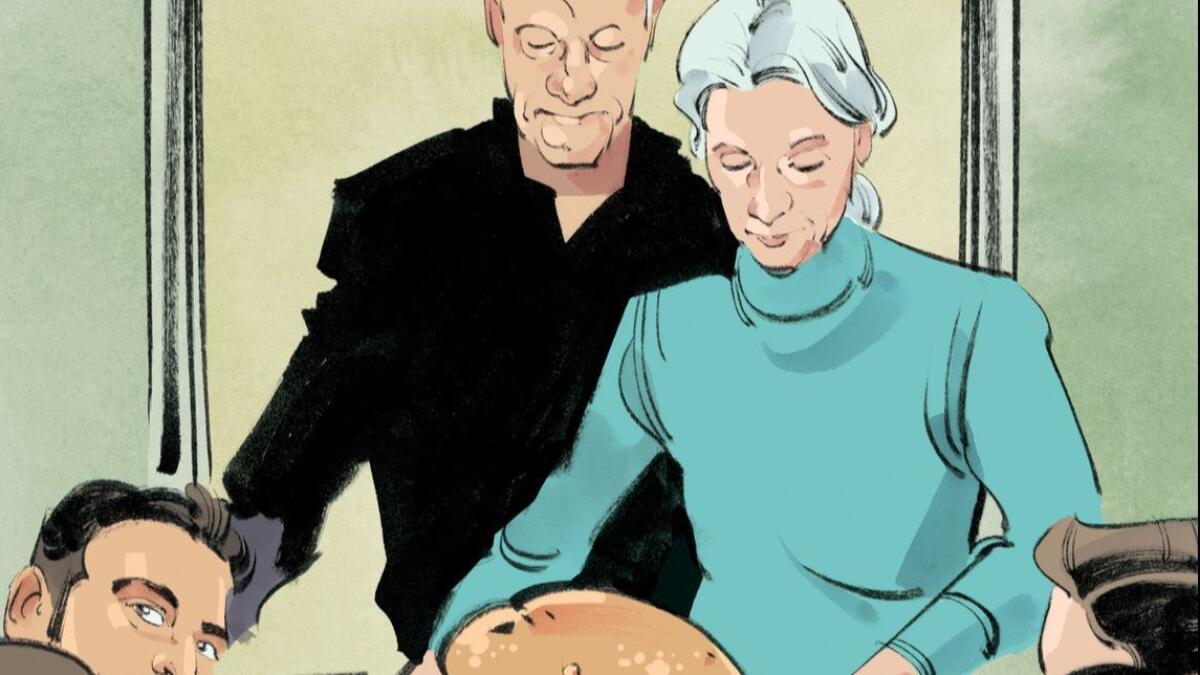I spent Thanksgiving on the ‘wrong side of the tracks,’ and it felt just right

When I was growing up, my family always traveled on Thanksgiving. But unlike the many Americans who spent hours on planes, trains and buses to reunite with relatives or friends, my parents and siblings piled into the car and trekked from our house in Encino to the Westside.
Our destination: the Velvet Turtle, a restaurant that on other days of the year was known for its beef Wellington and green goddess dressing, but on Thanksgiving served a traditional holiday meal.
Traveling to the Westside from Encino might not seem like a big trip now, but in the ’70s, they were like two different lands. People in “the city” were disdainful of “the Valley.”
In fact, besides Thanksgiving, the only other time I traveled “over the hill” was when I would take three buses to get to the beach in the summer, only to be met with this message spray-painted across the walls: “Vals Go Home.”
The Velvet Turtle was a perfectly nice place. We would all sit together at one large table, laden with crystal glassware and autumnal decorations. But my siblings and I resented eating out on Thanksgiving when everyone else was having their meal cooked at home.
Looking back, I realize my mother could have made the dinner. But it was a lot for one person to do, especially when no one helped. And no one in my family did help — not my dad who put his feet up on the table and griped: “I’ve got to work all week; this is my only time to rest!” Not us kids who also put our feet up and exclaimed: “We go to school all week! We need to rest too!”
It’s easy to see why my mom, overwhelmed and underappreciated, chose a restaurant. But there was something else.
Maybe you’ve heard about the type of Jewish mother who urges you to “eat, eat, eat!” Well, I had a different kind.
On Thanksgiving, she was on high alert. She counseled us to stick with the turkey, preferably the white meat because it had fewer calories, and to scrape the cream off the green beans. You’d get a dirty look if you ate too many carbs or dared to reach for seconds. She grimaced when you ate the crust of the pie, instead of just scooping out the pumpkin innards as she did.
“There’s no rule that says you have to stuff yourself on Thanksgiving,” she would tell us.
“Actually, there is!” we would protest. “You’re supposed to eat till you’re sick!”
But she would just shake her head. “Fine. It’s your body. Eat what you want.” Yeah. OK, Mom. Try to gobble down a plate full of stuffing and mashed potatoes after that.
When I got married, my husband and I started piling in the car and traveling in a different direction for the holiday: north. His family was also from the Valley, but they lived in Van Nuys.
My husband liked to joke that he came from the wrong side of the tracks. In our case “the tracks” was Ventura Boulevard. The way the Westsiders viewed the Valley-ites was similar to how the south-of-the-boulevard people viewed the folks who lived on the northern side.
The first year I traveled to the “wrong side of the tracks” to spend Thanksgiving with my in-laws, I experienced culture shock. The chairs were mismatched, the tablecloth was plastic, and I saw a whole bunch of dishes that would not have passed muster with my mother.
There were Jell-O molds (plural) with fruit suspended inside and layers of whipped cream; there were sweet potatoes drenched in brown sugar and marshmallows. There were two kinds of stuffing, two kinds of rolls and mashed potatoes with butter pooling on top.
And there were other unfamiliar sights. No one gave you the stink eye if you had the guts to reach for seconds or ate the crust off your pie. You were actually allowed to go into the living room and, more shocking, you could take a nap on the couch! And everybody helped, including my father-in-law who carved the turkey, stirred the gravy and washed every dish.
But the main difference had to do with the tone. Instead of the antagonism I always felt between my parents, there was a spirit of sharing and gratitude. Instead of feeling judged, I felt appreciated. Instead of the specter of perfection looming over me, all I felt was love.
Abrams is an Emmy-nominated television writer and producer whose credits include “Frasier,” “Spin City,” “Gilmore Girls” and many others. She is writing a novel.
More to Read
Sign up for The Wild
We’ll help you find the best places to hike, bike and run, as well as the perfect silent spots for meditation and yoga.
You may occasionally receive promotional content from the Los Angeles Times.






